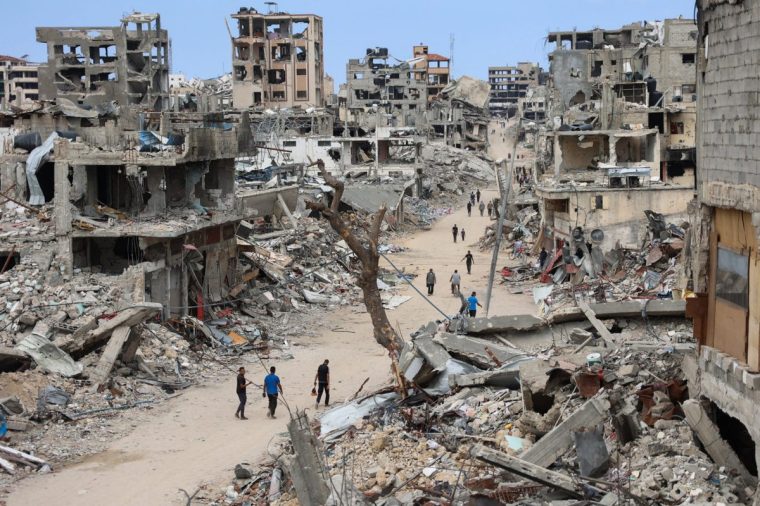Hamas has claimed a female Israeli hostage has been killed in an area of northern Gaza which had been struck by Israeli forces.
The group’s Al Qassam Brigades spokesperson Abu Obaida said another female hostage “remains in critical danger”.
So far the Israeli Defence Forces (IDF) have not confirmed or commented on the report.
Israel began its offensive in Gaza after the Hamas attack on 7 October 2023, which killed 1,200 people in southern Israel, with more than 250 others taken hostage.
Last month, Israel said more than 60 living hostages, and the bodies of about 35 others taken captive were still in Gaza.
Most of the rest were released during a ceasefire last year. It is thought 101 Israeli hostages remain in Gaza.

In September, Hamas executed six hostages the night before Israeli forces reached the tunnel where they were being held, according to the IDF.
Hamas had claimed they were killed as a result of Israeli air strikes.
In northern Gaza, the Health Ministry said at least 80 people were killed between Thursday and Friday, including near Kamal Adwan and Al-Ahli hospitals. It said dozens of people were trapped under the rubble.
The IDF said it wasn’t aware of a strike near Kamal Adwan and didn’t respond about the other attacks.
On Saturday, at least six people, including three children and two women, were reportedly killed in the southern city of Khan Younis.
The Palestinian death toll from the 13-month-long war surpassed 44,000 this week, according to the Hamas-run Health Ministry.
It has said more than half the dead are women and children. The Israeli military says it has killed over 17,000 Hamas members, without providing evidence.
The Israeli offensive in Gaza has devastated wide areas, and around 90 per cent of the population of 2.3 million people displaced, often multiple times.
Hundreds of thousands live in tent camps with little food, water or basic services.
On Saturday, Israeli air strikes in central Beirut killed at least 20 people, as strikes in the heart of Lebanon’s capital continued without Israeli warning.
Lebanon’s Health Ministry said 63 people were wounded in the strikes, the fourth in central Beirut in less than a week, with officials scrambling to secure a ceasefire.
US envoy Amos Hochstein travelled to the region in pursuit of a ceasefire deal to end months of fighting between Israel and Hezbollah that has erupted into full-on war.
Israeli bombardment has killed more than 3,500 people in Lebanon, according to Lebanon’s Health Ministry.
The fighting has displaced about 1.2 million, or a quarter of Lebanon’s population. On the Israeli side, about 90 soldiers and nearly 50 civilians have been killed by bombardment in northern Israel and the fighting.
The early morning strikes destroyed an eight-storey building in central Beirut. Hezbollah legislator Amin Shiri said no members of the militant group were inside.
“The area is residential, with closely packed buildings and narrow streets, making the situation challenging,” said Walid Al-Hashash, a first responder with the Lebanese Civil Defense.
Israel’s military did not comment on the casualties.
In a separate incident on Saturday, a drone strike killed two people and injured three in the southern port city of Tyre, according to the state-run National News Agency.
Mohammed Bikai, spokesperson for the Fatah Palestinian faction in the Tyre area, said those killed were Palestinian refugees from nearby al-Rashidieh camp who were out fishing.
Despite a warning last month by Israel’s army to avoid Lebanon’s southern coast, “you can’t tell someone who needs to eat that you can’t fish,” Bikai said.
The Health Ministry said other air strikes killed eight people, including four children, in the eastern town of Shmustar; five in the southern village of Roumin and five in the northeastern village of Budai.
Two Western diplomatic officials on Saturday described disputed points between Israel and Lebanon in ceasefire negotiations.
The current proposal calls for a two-month ceasefire during which Israeli forces would withdraw from Lebanon and Hezbollah would end its armed presence along the southern border south of the Litani River.
Thousands more Lebanese army troops would patrol the border area with UN peacekeepers, and an international committee would monitor implementation.
The officials said Israel wanted more guarantees that Hezbollah’s weapons are removed from the border area.
Israeli officials have said they would not agree to a deal that did not explicitly grant them freedom to strike in Lebanon if they believe Hezbollah is violating it.
Additional reporting from the wires.



Maurice Saatchi: I used to adore capitalism – then I had lunch with Margaret Thatcher